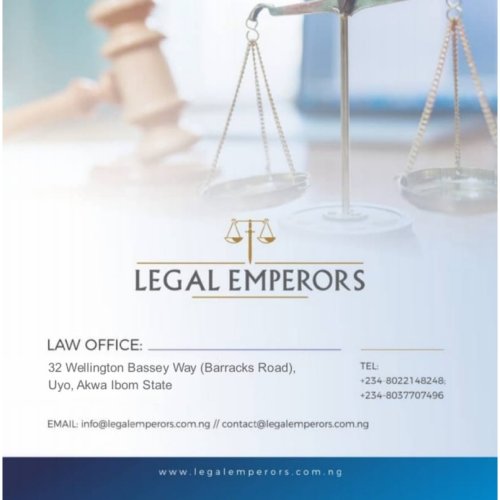Best Inheritance Law Lawyers in Nigeria
Share your needs with us, get contacted by law firms.
Free. Takes 2 min.
Or refine your search by selecting a city:
List of the best lawyers in Nigeria
1. About Inheritance Law in Nigeria
Inheritance Law in Nigeria blends statutory rules at federal and state levels with customary practices that still shape how assets are passed on after death. The law recognizes both testate succession (through a valid will) and intestate succession (where assets are distributed by statute when there is no will). Because many inheritance matters arise under state laws and customary norms, outcomes can vary significantly from one region to another. Probate and administration processes are typically handled by courts and probate registries, with lawyers playing key roles as solicitor, attorney or barrister depending on the case complexity.
Source: Federal Ministry of Justice Nigeria
The Nigerian system also places emphasis on protecting dependents, minors, and surviving spouses during the distribution of estates. In practice, this means that obtaining court confirmation through probate or letters of administration is often essential before transferring ownership of assets, especially land or bank accounts. Local customs and family arrangements frequently influence the practical distribution of assets within communities.
2. Why You May Need a Lawyer
Inheritance disputes and estate administration are complex and time consuming. A qualified solicitor or attorney helps protect your rights and reduces the risk of costly delays. Below are concrete Nigeria-specific scenarios where legal counsel is essential:
- No will exists and there are multiple heirs - You need a solicitor to establish eligibility under intestate rules, identify rightful shares, and pursue letters of administration to unlock assets.
- A will exists but is contested - You may face allegations of coercion, lack of testamentary capacity, fraud, or improper execution; a barrister will review validity and represent you in court.
- Probate or letters of administration are required - Banks, land registries, and utility providers usually require probate or administration before assets can be transferred.
- Land and property disputes under customary inheritance - Customary practices vary by region; a lawyer helps bridge subjective norms with statutory protections to secure your share.
- Guardianship or welfare for minors and dependents - Lawyers advise on court-approved guardianships and the protection of minors’ entitlements in estates.
- Tax and stamp duty considerations on estate transfers - An attorney can help minimise unnecessary charges and ensure compliance with Nigerian tax rules.
3. Local Laws Overview
Nigeria does not have a single codified inheritance code; statutory rules apply at the state level and are influenced by customary law in many communities. The interaction between statutory provisions, land tenure rules, and traditional practices creates a landscape where professional guidance is essential. The following statutes and regulations shape how estates are handled in Nigeria, especially in major urban centres like Lagos:
Wills Law (Lagos State)
This statute governs the creation, execution, and validity of wills within Lagos State. It sets out formal requirements for testamentary documents and matters related to the validation of a will. Practical consequences include how a will is admitted to probate and how executors are appointed.
Administration of Estates Law (Lagos State)
This law addresses the appointment of administrators when there is no valid will or when executors cannot act. It covers the process for collecting assets, paying debts, and distributing the net estate to lawful heirs under Lagos State rules. In Lagos, most estate transfers to heirs pass through the probate registry and related court orders.
Land Use Act and its inheritance implications (Federal Law impacting Nigeria)
The Land Use Act of 1978 regulates ownership and occupancy of land in Nigeria, including land inherited through family lines. It restricts freehold ownership to Nigerian citizens and vests occupancy rights in the state, with governors granting allocations. This Act influences how land bequests are executed and registered in estate matters across states.
Source: Federal Ministry of Justice Nigeria and Lagos State Government resources
4. Frequently Asked Questions
What is probate and why do I need it in Nigeria?
Probate is a court process that validates a will and appoints an executor. It allows assets to be distributed lawfully and helps banks and title registries recognize the executor's authority. Without probate, transferring assets can be delayed or blocked.
What is intestate succession and how does it work?
Intestate succession applies when there is no valid will. State laws determine heirs and shares, which may include spouses, children, and other relatives. The distribution rules vary by state and can be influenced by customary practices.
How long does probate usually take in Lagos or Nigeria generally?
Probate can take between 6 and 12 months in many cases, depending on court backlogs, complexity, and document completeness. Complex estates with land involvement often take longer.
Do I need a lawyer to obtain letters of administration?
While it is possible to apply without representation, a lawyer greatly helps align documents, assess debts, identify heirs, and navigate court processes. This reduces delays and the risk of disputes.
How much does hiring a lawyer for inheritance matters typically cost?
Costs vary by case complexity and location. Expect consultation fees, docket fees, and potential success fees or hourly rates. Some lawyers offer fixed-fee arrangements for straightforward probate matters.
What documents are usually required for probate or administration?
Common documents include death certificate, will (if any), probate petition, assets list, debt details, identity documents, and birth certificates for heirs. Additional documents may be requested by the court or banks.
Can a will be challenged or invalidated in Nigeria?
Yes. Challenges may arise from lack of capacity, undue influence, coercion, or improper execution. A lawyer helps determine the strength of a challenge and presents evidence before the court.
Should I hire a solicitor, attorney, or barrister for inheritance matters?
For routine probate and administration, a solicitor or attorney is typically appropriate. A barrister is generally engaged for courtroom advocacy when disputes require representation in higher courts.
Do I need to involve the court for asset transfer after a death?
Most asset transfers, especially real property, require court confirmation through probate or letters of administration. Banks and land registries often insist on court orders before updating records.
Is inheritance law the same across Nigeria, or does it differ by state?
Inheritance law differs by state due to the coexistence of statutory and customary rules. Lagos, Rivers, and other states have codified elements, while many communities still rely on customary inheritance practices.
What is the difference between a will and a codicil?
A will expresses final wishes for asset distribution. A codicil updates or amends a will without creating a new document. Both must be valid and properly executed to be effective.
5. Additional Resources
- Federal Ministry of Justice (Nigeria) - Provides national guidelines and information on probate, succession, and related legal matters. justice.gov.ng
- Lagos State Government - Official portal with references to state probate, wills, and administration of estates processes relevant to Lagos residents. lagosstate.gov.ng
- Nigeria Bar Association (NBA) - Professional body offering guidance on inheritance law practice, ethics, and finding qualified solicitors and attorneys. nba.org.ng
6. Next Steps
- Define your objective - Decide whether you need probate, administration, or dispute resolution. Allocate a budget and timeline for next steps.
- Collect key documents - Gather death certificate, will (if any), identification, property deeds, bank statements, and a list of heirs.
- Identify the right jurisdiction - Determine which state law applies based on where assets are located and where the deceased lived.
- Find a qualified inheritance lawyer - Look for solicitors or attorneys with Nigeria-specific experience in wills, probate, and estate administration. Check credentials with NBA.
- Schedule an initial consultation - Bring documents and questions. Ask about fees, timelines, and required documents for the first filing.
- Obtain a formal engagement - Sign a fee agreement and define scope, deliverables, and an expected timeline. Ensure written confirmation of costs.
- Prepare and file the probate or administration petition - Your lawyer will assemble forms, attach documents, and submit to the appropriate probate registry. Expect court notices and possible adjournments.
- Monitor progress and respond to requests - Courts may request additional documents or clarifications. Maintain copies and meet deadlines promptly.
Lawzana helps you find the best lawyers and law firms in Nigeria through a curated and pre-screened list of qualified legal professionals. Our platform offers rankings and detailed profiles of attorneys and law firms, allowing you to compare based on practice areas, including Inheritance Law, experience, and client feedback.
Each profile includes a description of the firm's areas of practice, client reviews, team members and partners, year of establishment, spoken languages, office locations, contact information, social media presence, and any published articles or resources. Most firms on our platform speak English and are experienced in both local and international legal matters.
Get a quote from top-rated law firms in Nigeria — quickly, securely, and without unnecessary hassle.
Disclaimer:
The information provided on this page is for general informational purposes only and does not constitute legal advice. While we strive to ensure the accuracy and relevance of the content, legal information may change over time, and interpretations of the law can vary. You should always consult with a qualified legal professional for advice specific to your situation.
We disclaim all liability for actions taken or not taken based on the content of this page. If you believe any information is incorrect or outdated, please contact us, and we will review and update it where appropriate.
Browse inheritance law law firms by city in Nigeria
Refine your search by selecting a city.

















